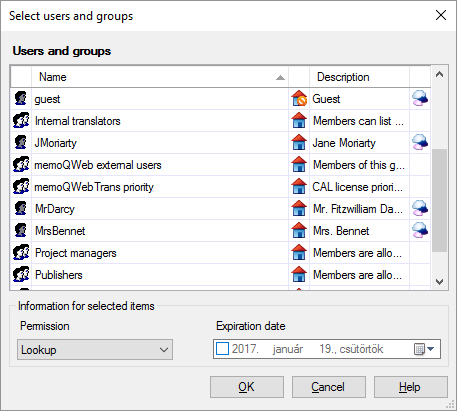Select users and groups (Permissions)
When you are granting permissions to users over a resource (a LiveDocs corpus, for example), you can choose who will get those permissions. You can choose from a mix of groups and users.
Always try granting permissions to groups, not users: You have a much better overview of permissions if you group every user by their roles, and grant the permissions to the groups.
Requires memoQ project manager: You need the project manager edition of memoQ to manage online resources and set permissions.
You need to be an administrator, or you need to have Admin permission: You may set permissions for a resource if you are a member of the Administrators group on the memoQ server, or else you have the Admin permission for that resource.
Normally, you should not need to set permissions: When a resource is created, memoQ server sets default permissions which are supposed to provide a good level of security, while keeping the resources usable. On the other hand, when you create an online project, and add resources to it, the participants automatically receive the permissions they need to work on the project.
Never give more permissions that absolutely necessary: For a resource, do not grant permissions to users who do not need it, and do not give them more power than they need. For example, do not grant the Update permission for a translation memory if the user will always just use it for reference, and never add new units. In information security, this is called the principle of least privilege.
How to get here
- Open the Resource Console. At the very top of the memoQ window - in the Quick Access toolbar
 -, click the Resource Console (document binder)
-, click the Resource Console (document binder)  icon. The Resource Console opens.
icon. The Resource Console opens. - On the left, under Resource, choose the type of resource that you need to set permissions for. You can choose any of them but the Muses: they do not have permissions.
- On the right, find the resource or resources where you need to check or change the permissions. Select one or more resources.
Must be online: You can set permissions for online resources only. Select resources that are on a memoQ server or a memoQ cloud.
- Under the list, click Set permissions. (Or, right-click the selection, and choose Set Permissions.) The Permissions window opens.
- To grant permissions to more users or groups: In the Permissions window, under the list, click Add.
The Select users and groups window opens.

What can you do?
- Select users and groups: Under Users and groups, click the group you want to grant permissions to. Or, press and hold down Ctrl, and click all the users and groups who will get this permission.
- From the Permission drop-down box, select the permission level (for example, Lookup). The selected users and groups will all get this permission.
To learn what permissions exist for various resources: See Help for the Permissions window.
- You can grant temporary permissions: If a user or a group does not need the permission forever, you can set an expiry date to the permission. Normally, groups and users get the permission for all times - or until it is removed. To make it expire, check the check box in the Expiration date box, and select a date. This may be the deadline of a project, for example.
Temporary permission? Think of using an online project instead: If a permission must end when a project is over, do not grant the permission here. Instead, add the affected users to the online project itself, and either assign documents to them, or appoint them as project managers - depending on their role in the project.
When you finish
To grant the permission to the selected groups and users, and return to the Permissions window: Click OK.
To return to the Permissions window without granting any permissions: Click Cancel.